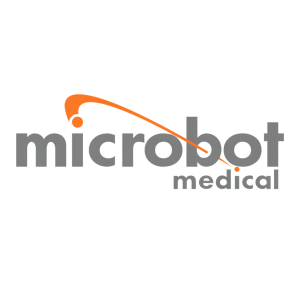Microbot Medical Enhances Scientific Advisory Board with World Renowned Interventional Radiologists
Rhea-AI Summary
Microbot Medical (Nasdaq: MBOT) has expanded its Scientific Advisory Board (SAB) with five renowned medical experts to enhance its leadership in micro-robotic technologies. The newly appointed members include specialists in interventional radiology and stroke therapy, such as Stephen B. Solomon, MD, and Ajay K. Wakhloo, MD PhD FAHA. CEO Harel Gadot emphasized the importance of attracting top talent to achieve significant clinical and regulatory milestones. Microbot Medical focuses on developing transformative technologies for minimally invasive procedures, contributing to advancements in the healthcare sector.
Positive
- Addition of five distinguished members to the Scientific Advisory Board enhances expertise in key medical fields.
- Expertise from new SAB members is expected to drive innovation in developing robotic surgical technologies.
Negative
- None.
News Market Reaction 1 Alert
On the day this news was published, MBOT declined 0.73%, reflecting a mild negative market reaction.
Data tracked by StockTitan Argus on the day of publication.
Scientific Advisory Board Expanded with Additions of Global Medical Pioneers and Distinguished Thought Leaders
HINGHAM, Mass., Jan. 21, 2021 (GLOBE NEWSWIRE) -- Microbot Medical Inc. (Nasdaq: MBOT) continues to enhance its thought leadership capabilities with the addition of several new Scientific Advisory Board (SAB) members: Stephen B. Solomon, MD, a board-certified radiologist with clinical expertise in Interventional Radiology with a focus in Tumor Ablation; Ajay K. Wakhloo, MD PhD FAHA, an internationally recognized expert in acute stroke therapy and the isolation of intracranial aneurysms and arteriovenous malformations; Gal Yaniv, MD, PhD, an endovascular neurosurgeon and leading authority on Artificial Intelligence; Dmitry J. Rabkin, MD, PhD, FSIR, a vascular and Interventional Radiology Specialist; and Ziv Neeman, MD, a vascular and interventional radiology clinician and researcher with a wide array of expertise, particularly in the field of navigation systems for minimally invasive image-guided interventional procedures.
“As we continue to develop and perfect our novel technologies, it remains critical that we also attract extraordinary capabilities throughout the organization - management, Board of Directors and Scientific Advisory Board - to leverage their combined expertise to achieve Microbot Medical’s objectives,” commented Harel Gadot, CEO, President and Chairman. “We are expecting a higher level of activity in the next year, including significant clinical and regulatory milestones, so our ability to attract leading talent and capitalize on their successes should enable us to maintain a competitive advantage and be at the forefront of developing innovative technologies to address the healthcare industry’s unmet medical needs.”
- Stephen B. Solomon, MD is Chief of the Interventional Radiology Service at Memorial Sloan Kettering, where he also holds the Enid A. Haupt Chair in Clinical Investigation. He is Director of Memorial Sloan Kettering’s Center for Image-Guided Interventions and leads a research lab that works to improve image-guided cancer interventions. He treats kidney cancer, liver cancer, lung cancer and bone cancer, has an interest in treating tumors with thermal ablation and performs hepatic artery embolization. Dr. Solomon was named a Castle Connolly: New York Magazine Top Doctor from 2012-2013 and 2015-2020. He received his undergraduate degree from Harvard, medical degree from Yale School of Medicine, and completed residencies at Yale-New Haven Hospital and The John Hopkins Hospital.
- Gal Yaniv, MD, PhD is a founder and the Chief Medical Officer at Aidoc, contributing his expertise and knowledge to help in the continuing development of advanced, healthcare grade AI. He is currently the Director, Endovascular Neurosurgery unit at Sheba – Tel HaShomer hospital. A double graduate (M.D, PhD, cum laude on both) of the Technion – Israel Institute of Technology, Dr. Yaniv completed his radiology residency at Sheba, Tel HaShomer hospital as well as diagnostic neuroradiology fellowship at Yale School of Medicine and endovascular neurosurgery fellowship at Mount Sinai Hospital. He has published numerous scientific publications focusing on basic science, radiology and public health, including a recent publication at the New England Journal of Medicine, and has presented in various scientific conferences worldwide. As a “Talpiot” alumni, he participates in the “Talpiot Medical Leadership Program” at Tel HaShomer Hospital.
- Dmitry J. Rabkin, MD, PhD, FSIR is a Vascular and Interventional Radiology Specialist, who is currently the Assistant Professor of Radiology at the Harvard Medical School and Assistant Chief of the Division of Interventional Radiology at the Brigham and Women's Hospital. Previously, he was a Clinical Director and Chief of the Division of Interventional Radiology at the Beth Israel Deaconess Medical Center, HMS, where he completed his residency in Diagnostic Radiology and a fellowship in Vascular and Interventional Radiology. He graduated from the First Moscow Medical School. Based on his achievements and contributions to the specialty, Dr. Rabkin has been elected to Fellowship of the Society of Interventional Radiology. Dr. Rabkin has been recognized as a Castle Connolly Top Doctor and Boston Magazine Top Doctor since 2016 for his professional qualifications, reputation and clinical skills in the field of Interventional Radiology.
- Ajay K. Wakhloo, MD, PhD, FAHA is certified by the American Board of Radiology in Neuroradiology and Diagnostic Radiology, and he currently serves as Chief of Neurointerventional Radiology and Professor at TUFTS University School of Medicine. Prior to Tufts, he was a tenured Professor of Radiology, Neurology and Neurosurgery and the Director, Division NeuroImaging and Intervention (NII) in the Department of Radiology, University of Massachusetts Medical School. Earlier in his career, Dr. Wakhloo was a tenured Professor of Radiology, Neurological Surgery and Biomedical Engineering in the Department of Radiology at the University of Miami, Miller School of Medicine. He received both his medical degree and Ph.D. from the University of Mainz, Germany and completed his Internship and Residency in Internal Medicine at the University of Mainz. His training was continued at the University of Freiburg, Germany in diagnostic and interventional Neuroradiology. He also completed fellowships in Neurosurgery at the University of Freiburg and Endovascular Neurosurgery at SUNY Buffalo, as well as Research Fellowships in Neurological Surgery at Barrow Neurological Institute and in Neurosurgery at SUNY Buffalo.
- Ziv Neeman, MD is the Director of the Diagnostic Imaging Institute and Nuclear Medicine at the Haemek Medical Center (Afula, Israel). He is affiliated with the Ruth & Bruce Rapport Faculty of Medicine (Technion, Israel) as Clinical Assistant Professor in the Diagnostic Radiology Department, where he trains medical students in the field of Diagnostic Imaging. He also serves as a guideline task force member for the European Society of Gastrointestinal Endoscopy. Dr. Neeman completed fellowships at Beth Israel Deaconess (Abdominal Imaging) and Georgetown University medical center (Interventional radiology). Prior clinical roles include Section Chief of Interventional Oncology in the Diagnostic Radiology Department at the National Institutes of Health (NIH) Clinical Center (Bethesda, MD), and Chairman of the Diagnostic Imaging Institute at the Haemek Medical Center. He was a partner at Diagnostic Imaging Inc. (Philadelphia, PA), where he practiced vascular and interventional radiology, interventional oncology and diagnostic radiology. He has held academic appointments in the Diagnostic Radiology Departments at both the NIH, and the University of Maryland Medical Center (Baltimore, MD). Over the span of his career, Dr. Neeman has published dozens of academic and clinical research articles in peer reviewed journals and serves as an ad hoc reviewer. He is a graduate of Ben Gurion University of the Negev Faculty of Health Sciences medical school, and completed an Abdominal Imaging fellowship at the Beth Israel Deaconess Medical Center (affiliated to the Harvard Medical School), Boston, MA and an Interventional and Vascular Radiology fellowship at the Georgetown University Medical Center, Washington, D.C, and is currently a member of the Israel Medical Association, the Israel Radiology Association and the Radiological Society of North America (RSNA).
The new SAB members join a renowned panel of neurosurgeons and thought leaders in robotic medical technologies, including Prof. Moshe Shoham. Prof. Shoham is the co-founder of Microbot Medical and founder of Mazor Robotics. The Company believes that the combined contributions from their diverse sets of expertise will help drive development of next generation robotic endoluminal surgery devices targeting the minimally invasive surgery space.
About Microbot Medical
Microbot Medical Inc. (NASDAQ: MBOT) is a pre-clinical medical device company that specializes in transformational micro-robotic technologies, focused primarily on both natural and artificial lumens within the human body. Microbot’s current proprietary technological platforms provide the foundation for the development of a Multi Generation Pipeline Portfolio (MGPP).
Microbot Medical was founded in 2010 by Harel Gadot, Prof. Moshe Shoham, and Yossi Bornstein with the goals of improving clinical outcomes for patients and increasing accessibility through the use of micro-robotic technologies. Further information about Microbot Medical is available at http://www.microbotmedical.com.
Safe Harbor
Statements pertaining to the registered direct offering, timing, the amount and anticipated use of proceeds and statements pertaining to future financial and/or operating results, future growth in research, technology, clinical development, and potential opportunities for Microbot Medical Inc. and its subsidiaries, along with other statements about the future expectations, beliefs, goals, plans, or prospects expressed by management, constitute forward-looking statements within the meaning of the Private Securities Litigation Reform Act of 1995 and the Federal securities laws. Any statements that are not historical fact (including, but not limited to statements that contain words such as “will,” “believes,” “plans,” “anticipates,” “expects” and “estimates”) should also be considered to be forward-looking statements. Forward-looking statements involve risks and uncertainties, including, without limitation, market conditions and the satisfaction of customary closing conditions, risks inherent in the development and/or commercialization of potential products, including LIBERTY™ and SCS, the outcome of its studies to evaluate LIBERTY, SCS and other existing and future technologies, uncertainty in the results of pre-clinical and clinical trials or regulatory pathways and regulatory approvals, uncertainty resulting from the COVID-19 pandemic, need and ability to obtain future capital, and maintenance of intellectual property rights. Additional information on risks facing Microbot Medical can be found under the heading “Risk Factors” in Microbot Medical’s periodic reports filed with the Securities and Exchange Commission (SEC), which are available on the SEC’s web site at www.sec.gov. Microbot Medical disclaims any intent or obligation to update these forward-looking statements, except as required by law.
Investor Contact:
Michael Polyviou
EVC Group
mpolyviou@evcgroup.com
732-933-2754








